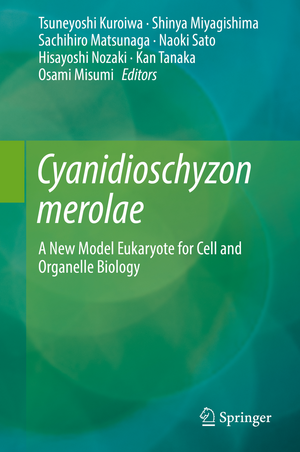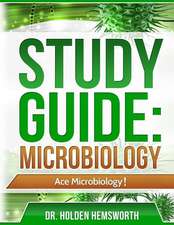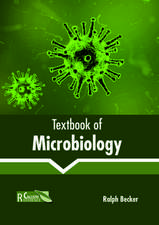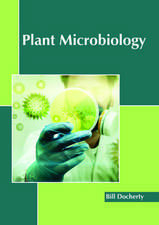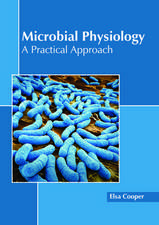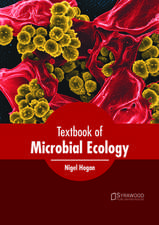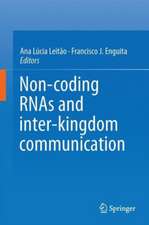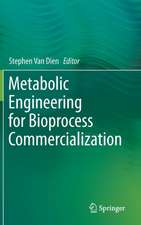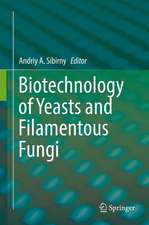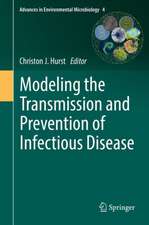Cyanidioschyzon merolae: A New Model Eukaryote for Cell and Organelle Biology
Editat de Tsuneyoshi Kuroiwa, Shinya Miyagishima, Sachihiro Matsunaga, Naoki Sato, Hisayoshi Nozaki, Kan Tanaka, Osami Misumien Limba Engleză Hardback – 15 feb 2018
| Toate formatele și edițiile | Preț | Express |
|---|---|---|
| Paperback (1) | 1042.42 lei 38-45 zile | |
| Springer Nature Singapore – 11 dec 2018 | 1042.42 lei 38-45 zile | |
| Hardback (1) | 1126.87 lei 3-5 săpt. | +27.88 lei 6-12 zile |
| Springer Nature Singapore – 15 feb 2018 | 1126.87 lei 3-5 săpt. | +27.88 lei 6-12 zile |
Preț: 1126.87 lei
Preț vechi: 1408.59 lei
-20% Nou
Puncte Express: 1690
Preț estimativ în valută:
215.65€ • 224.86$ • 179.23£
215.65€ • 224.86$ • 179.23£
Carte disponibilă
Livrare economică 28 februarie-14 martie
Livrare express 13-19 februarie pentru 37.87 lei
Preluare comenzi: 021 569.72.76
Specificații
ISBN-13: 9789811061004
ISBN-10: 9811061009
Pagini: 406
Ilustrații: XI, 365 p. 111 illus., 82 illus. in color.
Dimensiuni: 155 x 235 x 22 mm
Greutate: 0.67 kg
Ediția:1st ed. 2017
Editura: Springer Nature Singapore
Colecția Springer
Locul publicării:Singapore, Singapore
ISBN-10: 9811061009
Pagini: 406
Ilustrații: XI, 365 p. 111 illus., 82 illus. in color.
Dimensiuni: 155 x 235 x 22 mm
Greutate: 0.67 kg
Ediția:1st ed. 2017
Editura: Springer Nature Singapore
Colecția Springer
Locul publicării:Singapore, Singapore
Cuprins
Preface.- Part I. Birth, evolution and structure of primary eukaryote.- Chapter 1. The Genus Cyanidiales: evolution and habitat.- Chapter 2. Cellular structure of Cyanidioschyzon merolae : minimum set of organelles.- Part II. Synchronous culture of Cyanidioschyzon merolae and isolation of organelles.- Chapter 3. Cultivation, observation and application of conventional experimental procedures.- Chapter 4. Isolation of (dividing) organelles.- Part III. Genome and post-genomic analyses of Cyanidioschyzon merolae.- Chapter 5. 100% complete nuclear and organellar genome sequences.- Chapter 6. “Omics” analyses of Cyanidioschyzon merolae based on complete genome information.- Chapter 7. Procedures for transformation and their application.- Part IV. Techniques for Morphological and Structural Biology .- Chapter 8. Basic techniques for fluorescence and electron microscopy.- Chapter 9. Cytological analyses by advanced electron mic
roscopy.- Chapter 10. Structural analyses by cryogenic coherent X-ray diffraction imagingPart V. Proliferation of Eukaryotic Cell.- Chapter 11. Cell cycle and organelle division cycle.- Chapter 12. Synchronization of cell cycle by light and circadian rhythms.- Chapter13. Control of cell nuclear DNA replication by chloroplast and mitochondrion.- Chapter 14. Double-membrane-bounded organelles.- Chapter 15. Single-membrane-bounded organelles.- Chapter 16. Control of organelle division.- Part VI. Metabolism.- Chapter 17. Photosynthesis.- Chapter 18. Nitrogen metabolism.- Chapter 19. Carbon metabolism.- Part VII. Application.- Chapter 20. Application of the tolerance to extreme environment to other organisms.- Chapter 21. Metabolic engineering.- Appendix.- Index.
roscopy.- Chapter 10. Structural analyses by cryogenic coherent X-ray diffraction imagingPart V. Proliferation of Eukaryotic Cell.- Chapter 11. Cell cycle and organelle division cycle.- Chapter 12. Synchronization of cell cycle by light and circadian rhythms.- Chapter13. Control of cell nuclear DNA replication by chloroplast and mitochondrion.- Chapter 14. Double-membrane-bounded organelles.- Chapter 15. Single-membrane-bounded organelles.- Chapter 16. Control of organelle division.- Part VI. Metabolism.- Chapter 17. Photosynthesis.- Chapter 18. Nitrogen metabolism.- Chapter 19. Carbon metabolism.- Part VII. Application.- Chapter 20. Application of the tolerance to extreme environment to other organisms.- Chapter 21. Metabolic engineering.- Appendix.- Index.
Notă biografică
Tsuneyoshi Kuroiwa
Biological Imaging Center, Japan Women’s University
Tokyo, Japan
Shinya Miyagishima
Department of Cell Genetics, National Institute of Genetics
Shizuoka, Japan
Sachihiro Matsunaga
Dept of Applied Biological Science, Tokyo University of Science
Chiba, Japan
Naoki Sato
Department of Life Sciences, University of Tokyo
Tokyo, Japan
Hisayoshi Nozaki
Department of Biological Science, University of Tokyo
Tokyo, Japan
Kan Tanaka
Chemical Resources Laboratory, Tokyo Institute of Technology
Kanagawa, Japan
Osami Misumi
Dept of Biological Science and Chemistry, Yamaguchi University
Yamaguchi, Japan
Biological Imaging Center, Japan Women’s University
Tokyo, Japan
Shinya Miyagishima
Department of Cell Genetics, National Institute of Genetics
Shizuoka, Japan
Sachihiro Matsunaga
Dept of Applied Biological Science, Tokyo University of Science
Chiba, Japan
Naoki Sato
Department of Life Sciences, University of Tokyo
Tokyo, Japan
Hisayoshi Nozaki
Department of Biological Science, University of Tokyo
Tokyo, Japan
Kan Tanaka
Chemical Resources Laboratory, Tokyo Institute of Technology
Kanagawa, Japan
Osami Misumi
Dept of Biological Science and Chemistry, Yamaguchi University
Yamaguchi, Japan
Textul de pe ultima copertă
This comprehensive book highlights the importance of Cyanidioschyzon merolae (C. merolae), an ultrasmall unicellular red alga, as a model eukaryote organism. The chapters introduce recent studies on C. merolae, from culture, synchronization and isolation methods of nucleic acids, proteins and organelles for molecular biological and cytological analyses, as well as its application in genetic engineering of environmental-stress-tolerant crops and oil production. In addition to discussing recent advances based on the complete genome information and molecular biological techniques such as genetic modifications and bioinformatics, the book includes visualization aids demonstrating that both classical and recent imaging techniques of fluorescent and electron microscopy can be applied to analyses of C. merolae. This publication offers a definitive resource for both beginners and professionals studying C. merolae, particularly in thefield of molecular biology, evolutionary biology, morphology, biochemistry and cell biology, as well as those interested in its applications in medical sciences and agriculture.
Caracteristici
Includes information on a new model eukaryote for cell and organelle biology, Cyanidioschyzon merolae Presents molecular cell biological and cytological techniques including synchronization, microscopy and genetic engineering A definitive guide for both beginners and professionals in studying Cyanidioschyzon merolae
